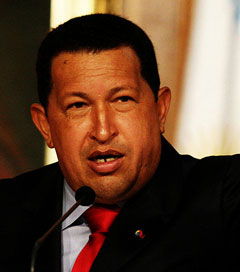Venezuelan President Hugo Chavez capped a four-day public relations blitz Monday with a triumphant return home after 26 days holed up in a Havana hospital.
It was the moment thousands of his followers had waited for: 56-year-old Chavez in his green fatigues and red beret, thinner, paler, but home. More vulnerable and solemn than Venezuelans are accustomed to, Chavez stood on the balcony of the Miraflores presidential palace before throngs of adoring fans that stretched as far as the eye could see and vowed to win his latest battle: cancer.
“Don't think my presence here this fourth of July means we won the battle,” Chavez said. “We are going to climb that hill and beat the evil that's embedded in my body, who knows for what reason.”
Chavez repeatedly thanked God and his “chief doctor” – Cuba's Fidel Castro.
“Christ is with us,” he said. “Who is against us?”
It was the controversial president's first public appearance in more than a month. He slipped into Caracas in the middle of the night Monday, just in time to show his face for the country's 200th independence day celebration Tuesday.
Chavez fell ill June 8 while on a visit with Castro in Havana.
After weeks of denials by his cabinet, he revealed that doctors discovered not just a pelvic abscess, but also a malignant tumor. The tumor was removed after a 6 1/2-half hour surgery, his second that month.
He never said what kind of cancer or what stage.
He acknowledged that the June 20 surgery was grueling, and he suffered a crisis the 24th. The president expressed amazement that he could be back in Caracas so soon afterward.
Acknowledging that he wasn't going to offer too many details about his health, Chavez said doctors have him on a strict regimen of medicines, exercise and rest. He wakes at 5 a.m. and eats yogurt. “I've turned into a first-year cadet,” he said.
“This man is never going to die,” said Yanet Perez, a 36-year-old mother of four. “The people love him too much.”
Many Venezuelans are deeply devoted to Chavez because of the social works he funded including scholarships and education programs. But the former paratrooper has drawn the ire of many others who say the socialist revolutionary illegally consolidated power and used government institutions to shut out his enemies.
Perez said she attended Monday night's welcome gathering to thank Chavez and his government for putting her in an emergency shelter after floods destroyed her home in November. The government has promised a fully furnished apartment in five months.
She was joined by thousands of people who flocked downtown, some selling Hugo Chavez action figures and head-bands. School teacher Elena Ortiz, 30, held up a sign that read, “Welcome back president, you were with us all along” scrawled on the back of a mathematics lesson poster.
“This is the best gift we've had in 200 years,” she said.
The surprise return to Venezuela came after three days of videos aired by the Venezuelan government showing Chavez recuperating and working from Havana. Footage showed him holding a cabinet meeting, strolling hand-in-hand with his daughters and chatting with the Cuban press.
“It's evident that there's a full-fledged communications strategy to show that he's fine,” said Leopoldo Lopez, an opposition politician who was disqualified from the 2012 race. “I hope he is getting better. We wish him a speedy recovery, so that he can be a candidate in 2012 and be beaten by votes. We don't want him beaten by an illness.”
Chavez's illness has heightened political uncertainty and called attention to the lack of viable leaders in his party. During his absence, Chavez's brother, Barinas Gov. Adan Chavez, said the country would take up arms to defend the revolution – sparking divisions within official camps, said Armando Duran, a former foreign minister.
“No one is governing Venezuela right now,” Duran said. “Nobody is making decisions.”
Vice President Elias Jaua said Chavez is expected to hold a cabinet meeting this week.
“The revolution has never been at risk, because it has a people who will defend it,” Jaua said.
When Ariuzka Vargas, 39, heard the news of Chavez's return Monday morning, she rode by bus for four hours from Guarico state. She prayed for his health for days, and was impressed by how strong his voice sounded.
“We're in love with the socialist process, not the man,” Vargas said. “Right now I simply can't imagine anyone being able to take his place.”
Special correspondent Sandra Sierra Nunez contributed to this report.
© 2011 McClatchy-Tribune Information Services
Truthout has licensed this content. It may not be reproduced by any other source and is not covered by our Creative Commons license.
Speaking against the authoritarian crackdown
In the midst of a nationwide attack on civil liberties, Truthout urgently needs your help.
Journalism is a critical tool in the fight against Trump and his extremist agenda. The right wing knows this — that’s why they’ve taken over many legacy media publications.
But we won’t let truth be replaced by propaganda. As the Trump administration works to silence dissent, please support nonprofit independent journalism. Truthout is almost entirely funded by individual giving, so a one-time or monthly donation goes a long way. Click below to sustain our work.
